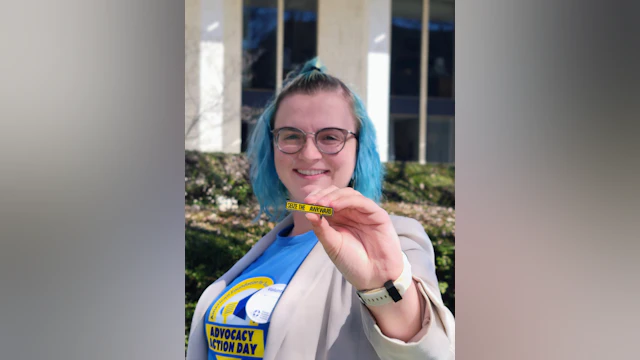As a student pursuing a Master of Public Health degree at the University of North Carolina at Charlotte, most days I sit at my computer typing up formulas and analyzing data. Though it may sound boring, I love being able to sort through numbers and words to tell stories that interpret meaning from data. Analyzing data allows me to make evidence-informed decisions and recommendations for future work. As a mental health advocate and suicide attempt survivor speaking out for policy change, these evidence-informed decisions become all the more important. The question is, how do I combine my love for data and my love for advocacy?
The American Foundation for Suicide Prevention’s Advocacy Action Days are the perfect way for me to have the best of both worlds! Advocacy Action Days (AAD) are AFSP events that bring Volunteer Advocates in each state to meet with legislators to talk about how we can and must work together to prevent suicide. AADs are usually centered around particular bills being proposed in that state that align with AFSP’s policy priorities, like lethal means safety.
Typically, the local AFSP chapter or combination of chapters in each state will schedule meetings with legislators, governors, and other members of the legislative process; then, volunteers get the chance to speak with said legislators during the event.

As the qualitative data intern with AFSP’s national headquarters and a volunteer with the North Carolina Chapter, I not only had the opportunity to attend the North Carolina AAD in 2025, but I also have had the pleasure of conducting qualitative analyses of previous AADs. For context, after attending Advocacy Action Day events, participants fill out a survey to reflect on their experience at the event. My role as an intern was to look at those responses and analyze the data to develop recommendations for future events. Through multiphase coding and theming, which involved labeling segments of data with key ideas and later refining those insights and grouping them into themes, I was able to understand participant responses and evaluate the events. My goal with program evaluation is to notice trends and areas for improvement to expand the reach and effectiveness of AAD events across the country.
When analyzing the post-event surveys from 2024, there was overwhelmingly positive feedback on the success of AADs across the nation. One participant even said, "It was a fantastic event, and, as always, an honor to be part of."
As is common in advocacy work, the feedback revealed that advocates have differing experiences and varying degrees of success in their meetings. This information helps AFSP continuously improve AAD events, providing the most useful resources for advocates and supporting chapters in their planning and implementation processes. For example, many participants mentioned wanting more information about the bills being advocated for in advance, so they could prepare. This feedback can be easily integrated into positive change for future events.
One thing I took away from the data is the way AFSP’s Volunteer Advocates were energized by the event. I noticed many comments about people feeling “inspired” or “motivated” or “confident in making an impact.” These comments reassure us as evaluators that the events are doing what they are meant to do; and it is reassuring to the staff and volunteers planning these events to know that people are being positively impacted by AFSP’s efforts.
Participating in North Carolina’s AAD after spending so much time coding and evaluating feedback surveys was exciting and eye-opening. North Carolina’s AAD focused on legislation that would restrict access to lethal means, specifically firearms, through lock box distribution and incentivizing voluntary transfers. The sense of empowerment I felt after connecting with my fellow chapter volunteers and using our collective knowledge and experience to advocate for suicide prevention in legislation was wonderful. It became clear the impact we can make when our voices come together.
I spoke with three different legislators and had three different experiences. One only had a minute to spare, so our group rushed through the North Carolina policy priorities to make what impact we could. One was eager to listen and was aligned with our interests. One listened thoughtfully and asked many questions. I learned something from each of these experiences and, in the end, my commitment to advocating for suicide prevention legislation was solidified.
I thoroughly enjoyed experiencing both ends of the Advocacy Action Days – the event itself, and the evaluation of its impact. Mental health and suicide prevention advocacy have been a significant part of my life both before and after my attempt. I feel fortunate to be here using my voice with AFSP and to have a network of supporters through this organization.
I am motivated to continue my work related to evaluation and to continue in my advocacy. And because I know the importance of data collection, yes, I filled out the post-event survey for the North Carolina AAD.
Learn more about how you can get involved in advocating for suicide prevention.